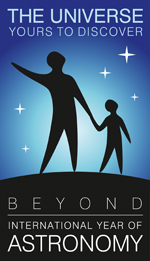IYA2009 Session at the Public Communication of Science & Technology Conference
8 December 2010
The International Year of Astronomy: How did it go and what did we learn?
Public Communication of Science & Technology Conference 2010
Thematic Session II C / Lecture Hall (II Floor)
Wednesday, 8 December, 16:30
Chair: Pedro Russo (IAU/ESO ePOD, Germany)
Coordinator: Steve Miller University College, London, U.K
In 1609, Galileo turned his telescope – then recently invented – towards the sky above him. What he saw amazed him and led him openly to question the then-prevailing teachings that the Earth was at the centre of the universe and that, above the near-Earth environment, the heavens were pure and unchanging. Moreover, Galileo’s observations and his interpretations of them opened up every received dogma about the natural world to critique based on personal measurements and personal reason.
To mark the 400th anniversary of that system-shattering event, the International Astronomical Union organised the 2009 International Year of Astronomy (IYA2009) under the theme “The Universe, Yours to Discover”.
Many spectacular initiatives took place during 2009 and early 2010, from the twelve global Cornerstone projects to the thousands of national activities where millions of people got involved in astronomy-themed events. Citizens previously unaware of astronomy became involved in this most democratic of sciences in vast numbers. Activities ranged from star parties to street parades, touching old and young alike. Take, for example, the two worldwide star parties “100 Hours of Astronomy” and the “Galilean Nights” where more than 3 million people got involved with many citizens seeing night sky objects through a telescope for the very first time; the Indian astronomers proudly showcasing their work at the Republic Day parade in Delhi, where around 30.000 people participated; or the Guinness World Record 4.8 km-long canvas painted during the astronomy-themed Oceans Festival with more than 300 000 participants in Portugal.
But how was the celebration of an essentially western, essentially European, “scientific revolution” received across the globe, with its various social and cultural environments?
Making use of the global experiences, this session will look critically at the experience of IYA2009. It will describe some of the events that occurred, their reception and what astronomers and science communicators have learned from their experiences.
Programme
- Pedro Russo (Germany): The International Year of Astronomy 2009: Results and Legacy
- Fumi Yoshida (Japan): The Stars of Asia project
- Anita Heward (UK): Europlanet IYA2009 Activities
- Marta Entradas (UK): EsConet training for the IYA2009 nodes
- Prajval Shastri (India): The Indian Institute of Astrophysics IYA2009 Activities
- Kathan Kothari (India): Manthan Educational Programme Society IYA2009 Activities
- Zhu Dayi (China): Shanghai Astronomical Observatory IYA2009 Activities
Search IYA2009 Updates

National Nodes: 148
Organisational Nodes: 40
Organisational Associates:33
National Websites: 111
Cornerstone Projects: 12
Special Task Groups: 11
Special Projects:16
Official Products:8
Media Partners:22


